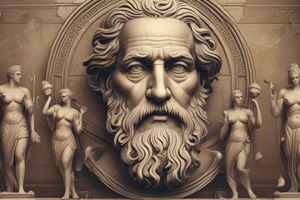Podcast
Questions and Answers
Which of the following are categorized as Pre-Socratic thinkers?
Which of the following are categorized as Pre-Socratic thinkers?
- Natural Philosophers (correct)
- Pre-Scientific Scientists (correct)
- Socratic Philosophers
- Post-Socratic Scholars
What two main topics were the Pre-Socratics concerned with?
What two main topics were the Pre-Socratics concerned with?
The problem of the one and the many, and the cosmic order in the universe.
What did Thales of Miletus believe the arche was?
What did Thales of Miletus believe the arche was?
Water
What was Anaximander's concept of the arche?
What was Anaximander's concept of the arche?
According to Heraclitus, what is the only constant in the universe?
According to Heraclitus, what is the only constant in the universe?
Which ancient philosopher is known for the Pythagorean theorem?
Which ancient philosopher is known for the Pythagorean theorem?
What did Parmenides argue about change?
What did Parmenides argue about change?
What principle did Democritus introduce?
What principle did Democritus introduce?
Which of the following forces did Empedocles associate with the cycle of elements?
Which of the following forces did Empedocles associate with the cycle of elements?
Anaxagoras introduced the idea of ______ as the guiding and ordering principle of the universe.
Anaxagoras introduced the idea of ______ as the guiding and ordering principle of the universe.
What are the two main approaches to knowledge discussed by the Presocratics?
What are the two main approaches to knowledge discussed by the Presocratics?
Study Notes
The Presocratics: The Beginning of Philosophy
- The Presocratics were a group of thinkers who lived before Socrates
- They marked a shift from explaining the world through myths to using logic and reason
- They were influenced by interactions between different cultures, leading to fundamental philosophical questions
- They were divided into two main groups:
- Pre-Scientific Scientists
- Natural Philosophers, focused on understanding nature
- Two main philosophical themes:
- The problem of the one and the many:
- Exploring the nature of reality
- Determining the fundamental components of the universe
- Exploring the concept of an "arche" principle that determines the basic structure of reality
- Distinguishing between Monism (one underlying principle) and Pluralism (multiple principles)
- Is there a cosmic order in the universe?:
- Exploring whether there is a fixed order in the universe
- Investigating whether this order extends to moral values
- The problem of the one and the many:
The Milesians
- Philosophers from Miletus, a region in Greece and Asia Minor
- Thales of Miletus (600 BC) is considered the first philosopher
- He believed the arche was water, because of its adaptability as a liquid, solid, and gas, and its role in life
- He believed the world was imbued with a soul, guided by mind, order, or logos
- Anaximander
- He was the first to write philosophy
- He proposed the "boundless" as the arche, an undefined, impersonal, and everlasting principle
- Anaximenes
- He believed air was the arche, and that fire resulted from its expansion, while other elements were created through condensation
Heraclitus
- Lived in the late 6th century BC
- He believed fire was the arche, because it is constantly changing and represents the ever-changing nature of the universe
- Everything in the universe is in a state of flux
- The only constant is the universe itself, like a constantly moving river
- He associated fire with logos, representing a principle of order and meaning in the universe
- Humans should live a life guided by logos, prioritizing sane thinking as the greatest virtue
Pythagoras
- Known for the Pythagorean theorem
- Believed numbers were the arche
- Emphasizing the role of mathematical relationships in the structure of the universe
- Connecting fire with mathematical order
- Founded a religious movement based on abstract thought, asceticism, and the transmigration of souls
The Eleatics
- Parmenides of Elea, a philosopher who challenged Heraclitus' views
- He believed change was an illusion
- He proposed "the One" as the arche, a non-material, unchanging, finite principle
- Sensory experiences are misleading, while true knowledge comes from abstract thought
- Zeno of Elea, a student of Parmenides
- Defended his teacher's ideas by proposing paradoxes like Achilles and the Tortoise and the Flying Arrow
- Raised questions about the nature of time and space
Empedocles
- Lived in the 5th century BC
- Believed all four elements (earth, air, fire, water) were the arche
- These elements existed in a cycle of combination and disintegration
- He proposed two forces driving this process: love and hate/attraction and repulsion
- This led to questions about the nature of inner order (purpose) versus a purely mechanistic process
Anaxagoras
- Lived in the 5th century BC
- Believed in an "arche" of "seeds," a fundamental element for everything
- He introduced the concept of "nous" (mind), an immaterial and rational principle
- Everything was guided and ordered by a cosmic mind, offering a teleological explanation for the universe
- This marked the beginning of theological thought
Democritus (460 BC) - The Atomists
- Proposed atomos (uncuttable) as the arche, introducing the concept of atoms
- All things are composed of infinitesimally small, indivisible objects
- Atoms have different shapes and spin in a vortex, their combinations create the world
- He believed all things arose from pure chance, driven by mechanisms and motion
- No mind, order, or purpose
- The universe operated on blind forces
- He advocated for a life guided by reason, even in a universe without order
- Reasoned hedonism, weighing pleasure and pain
- Living a life guided by reason is beneficial
Importance of the Presocratics
- The Presocratics were significant for the questions they raised, rather than necessarily the answers they provided.
- Key philosophical questions they addressed:
- Metaphysics:
- Mechanism vs Teleology: Is the universe governed by a specific purpose or by blind mechanisms?
- Reality of matter and change: Is matter real or an illusion? Is change a real phenomenon or an illusion?
- Mind and matter: Are mind and matter two separate entities, or are they one and the same?
- Cosmic order and God: Is there a source of cosmic order like a divine being?
- Determinism vs Free Will: Are our actions predetermined, or do we have free will?
- Ethics:
- The role of reason in a universe with order: If the universe is ordered, should we live a rational life?
- What should we do in a universe without order?
- Epistemology:
- Empiricism vs Rationalism: Is knowledge derived from our senses (empiricism), or from abstract thought (rationalism)?
- Reliability of sense experience: How can we be sure that our senses provide accurate information?
- The nature and sources of abstract thought: How does abstract thought provide knowledge, and how does it connect with reality?
- Connection between sense experience and abstract thought: Are these two ways of knowing related, and if so, how?
- The limitations of human knowledge: What are the limits of our ability to know and understand the universe?
- Metaphysics:
Studying That Suits You
Use AI to generate personalized quizzes and flashcards to suit your learning preferences.
Related Documents
Description
Explore the foundational ideas of the Presocratic philosophers who transitioned from mythological explanations to rational thought. Delve into key themes such as the nature of reality and the quest for a cosmic order. Understand the divisions between pre-scientific scientists and natural philosophers in shaping early philosophical discourse.




